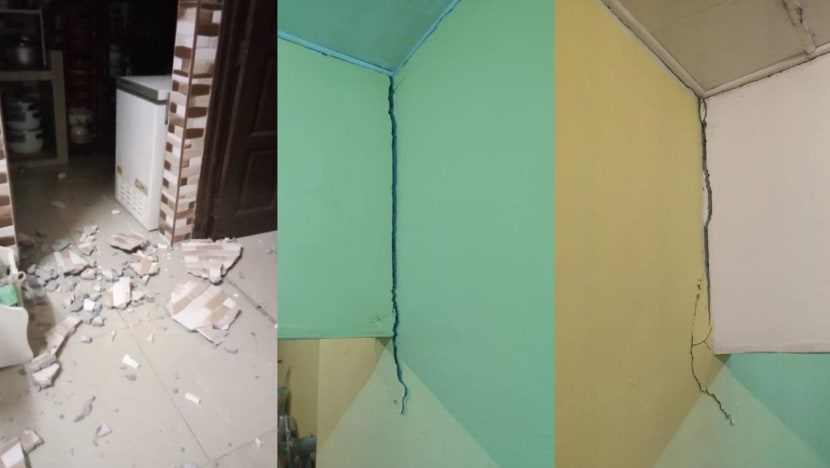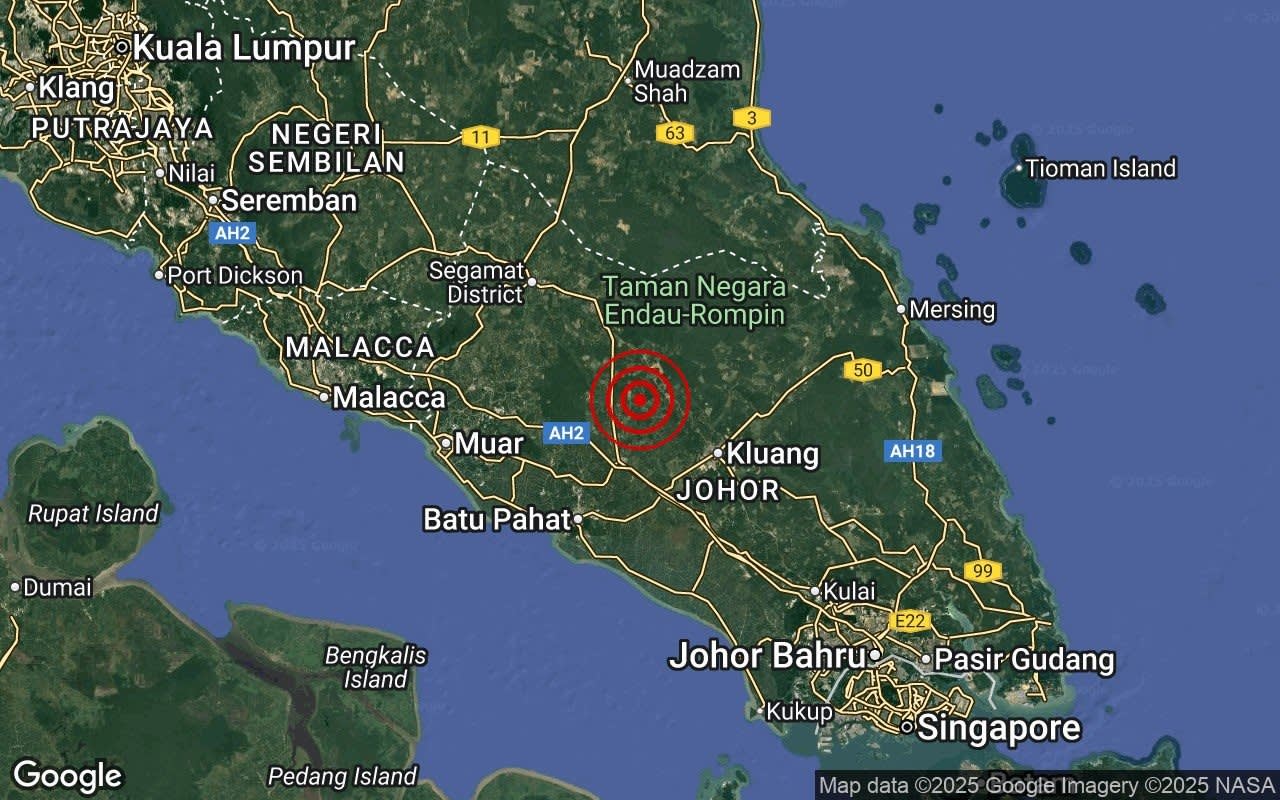Magnitude 4.1 earthquake strikes Johor; tremors felt in several Malaysian states
Tremors were felt in most areas of Johor, Negeri Sembilan, Melaka and southern Pahang.

Photos shared on social media showed debris from the ceiling falling and cracks on the walls of a home after a 4.1-magnitude earthquake hit Segamat in Johor, Malaysia on Aug 24, 2025. (Photos: X/Jimmy Puah, Facebook/Komuniti Segamat/Kapten Azali)

This audio is generated by an AI tool.
JOHOR BAHRU: A weak earthquake struck the Malaysian state of Johor early on Sunday (Aug 24), with tremors felt across several states.
The 4.1-magnitude quake occurred at about 6.15am, 5km west of the town of Segamat at a depth of 10km, the Malaysian Meteorological Department (MetMalaysia) said in a Facebook post.
The authorities said tremors were felt in most areas in Johor, Negeri Sembilan, Melaka and southern Pahang.
It sparked panic among some Segamat residents, who also described hearing a loud sound. Footage of the moment captured on closed-circuit television cameras showed vehicles shaking briefly and car alarms going off.
A second, milder quake occurred at 9am. MetMalaysia said in an update that tremors from the 2.8-magnitude quake were felt in the same areas as the first. The epicentre of the second quake was 28km northwest of Kluang, Johor.
"LOUD BANG"
After the first quake, MetMalaysia said it would continue to monitor the situation and that there was no tsunami threat to the country.
Johor Chief Minister Onn Hafiz Ghazi said on Facebook early on Sunday morning that there were no reports of accidents or property damage in Segamat.
He added that the Johor state government was closely monitoring the situation with the relevant agencies. Members of the public were also advised to stay away from unstable structures and to heed instructions from the authorities.
Reports of minor damage later surfaced on social media and in local media reports.
According to The Star, several people narrowly escaped injury when ceiling plaster collapsed at a prayer hall in Segamat's Kampung Sanglang. The imam recounted hearing a "loud bang" before pieces of ceiling plaster came crashing down.
Photos shared by the Komuniti Segamat Facebook page showed cracks in a home in Segamat's Kampung Tengah area, while Malaysian politician Jimmy Puah also shared a photo of fallen debris in a home.

"I THOUGHT A PLANE HAD CRASHED"
Speaking to Bernama, a Segamat resident said he was getting ready for work when his home suddenly shook at about 6.15am.
"I thought the house was about to collapse. I panicked and quickly got my wife and child out of the house. A neighbour then said it might have been an earthquake," said 32-year-old Nur Hafiz Mukmin.
Another resident, Ms Normala Mohamed, told Bernama that the glass panels in her house shook violently, prompting her to rush into the kitchen as she was worried something had happened.
"Thankfully, there was no damage to the house, but the tremor was completely unexpected."
FarisMohdKhir shared in a post on X that he was sleeping when he suddenly "heard a loud noise and everything was shaking".
"I thought a plane had crashed or something, turns out there was an earthquake in Segamat."
Reddit user narevaris also described waking up to "what sounded and felt like a lorry smashing into the house".
PIPELINE INFRASTRUCTURE, FACILITIES REMAIN SECURE
Following the quake, Malaysia’s national oil and gas company Petronas confirmed that all pipeline infrastructure and facilities within the affected region remained "fully secure and operational".
"Upon receiving notification of the tremor, our technical and regional teams promptly implemented standard safety protocols that are already in place for such events across the Southern Region," it said in a statement.
Checks were carried out at the Segamat compressor station, Segamat control station, and along the relevant pipeline right-of-way.
No abnormalities or disruptions were detected, said Petronas, adding that live monitoring confirmed that pressure levels and operational parameters remained stable.
The company is also maintaining "active communication" with relevant local authorities and the Malaysian Meteorological Department for ongoing updates.
COUNTRY NOT COMPLETELY IMMUNE
While Malaysia is located outside the Pacific Ring of Fire, the country is not completely immune to the risk of earthquakes, said one expert.
The Institute of Geology Malaysia’s president Abd Rasid Jaapar told Bernama in March this year that while Malaysia is not situated along the collision zone of major tectonic plates, several minor tremors have been recorded in certain areas over recent decades.
"Earthquakes are unpredictable in both location and magnitude. For instance, Bukit Tinggi once experienced a 3.8-magnitude earthquake on the Richter scale. However, at present, there is no significant earthquake risk in Peninsular Malaysia," he said.
He added that the risk is higher in Sabah, where it is close to active seismic zones.
Malaysia has experienced strong earthquakes in the past, particularly in Sabah, according to Bernama. Quakes with magnitudes between 6.0 and 6.3 were recorded in 1923, 1958, 1976 and 2015. In Sarawak, the strongest recorded tremor was a 5.3-magnitude quake in 1994.
Peninsular Malaysia has also seen several earthquakes, with epicentres in Bukit Tinggi, Pahang; Kenyir Dam, Terengganu; Kuala Pilah, Negeri Sembilan; and Manjung and Temenggor in Perak.
The quakes, ranging from magnitudes 1.6 to 4.6, occurred between 1984 and 2013.













